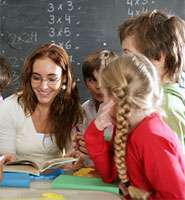'Virtual' head teachers benefit children in care

(PhysOrg.com) -- New research from the School for Policy Studies shows that 'virtual' head teachers significantly raise the priority of education and outcomes for children in care, who are often less successful at school than other pupils.
This is due to a complex range of factors that might include an unstable family background, shortcomings in the care environment, low expectations and poor communication between social workers, carers and schools.
The ‘virtual school heads' (VSH) initiative appointed a senior employee within a local authority with the responsibility of overseeing and co-ordinating educational services for children in care. Children in care attend a range of local schools but the role of the VSH was to improve educational standards as if they were attending a single school.
Funded by the Department for Children, Schools and Families (DCSF), the nine-month evaluation, which ran from October 2008 to June 2009 in 11 local authorities throughout England, assessed the success of the pilot and the effects it had on children’s educational experiences. Led by Professor David Berridge with colleagues from the Centre for Family Policy and Child Welfare, the research aims were to:
• map the range of activities undertaken by the VSHs
• examine professionals’ and children’s awareness and experiences of the VSH
• investigate the educational outcomes for children in care and the influences on them
• identify examples of ‘good practice’.
While VSHs encountered difficulties accessing quality student information and administrative support, which most traditional head teachers would have ready access to, the research identified many examples of good practice including a dedicated homework helpline for students, student visits to concerts, museums and art galleries, and opportunities for students to learn a musical instrument.
Analysis of official government statistics showed that during the period of the pilots, all 11 authorities performed well against the national average and most showed improvement in GCSE results.
Across the groups taking part in the research, it was generally perceived that the VSHs fulfilled a valuable role, operating at the heart of complex issues in inter-professional working between education and social work and contributing towards their integration. It was felt that being head of a 'school' helped forge a link with, and communicated important information to, other local heads.
DCSF has recently described this research as a ‘major milestone’ in supporting the education of children in care and most local councils have now appointed VSHs.
The full report is available from the DCSF website (PDF, 641Kb).
Provided by University of Bristol
















